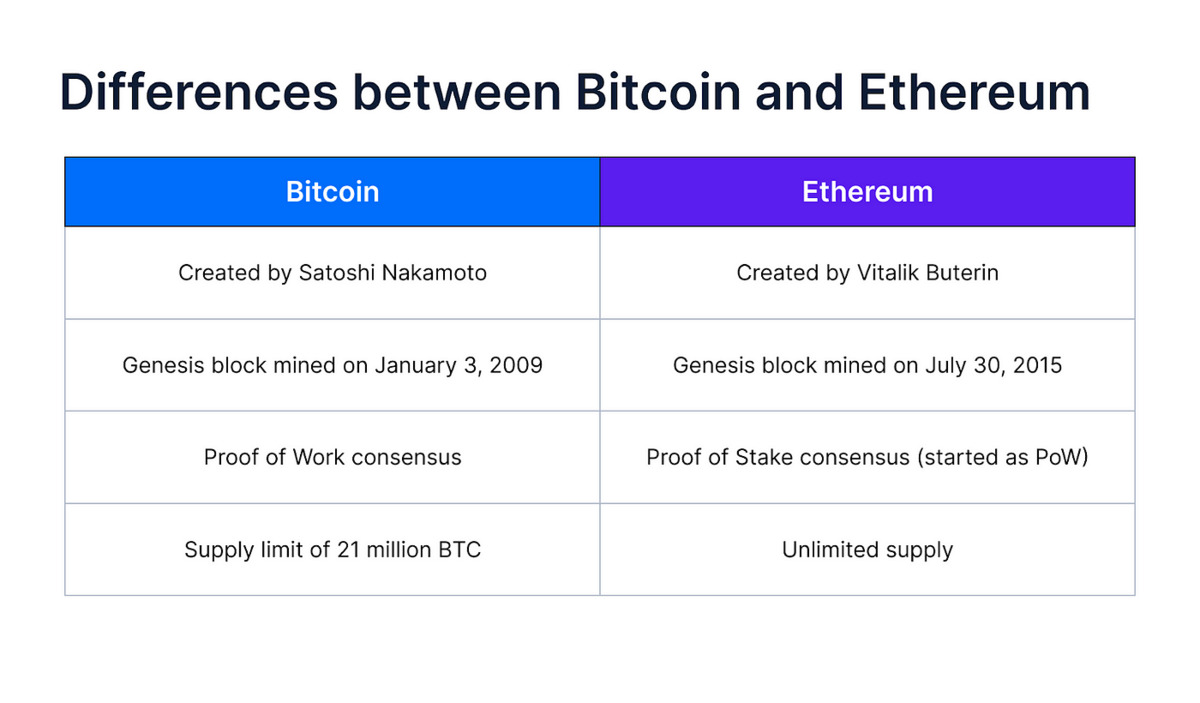Difference Between Bitcoin And Ethereum Geeksforgeeks Explained
Kicking off with difference between bitcoin and ethereum geeksforgeeks, the world of cryptocurrency often sparks curiosity and debate, especially when two giants like Bitcoin and Ethereum dominate the landscape. Each of these cryptocurrencies has carved a unique niche, attracting diverse communities and innovators alike.
Bitcoin, the pioneer of digital currencies, emerged as a decentralized digital currency while Ethereum introduced smart contracts and decentralized applications, revolutionizing how value and agreements are perceived in the digital realm. Understanding the nuances between these two can significantly impact how investors and enthusiasts navigate the ever-evolving crypto market.
Introduction to Bitcoin and Ethereum
Bitcoin and Ethereum are two of the most recognized and influential cryptocurrencies in the digital currency market today. Bitcoin, created in 2009 by an anonymous figure known as Satoshi Nakamoto, was the first cryptocurrency that introduced the concept of decentralized digital currency. Ethereum, launched in 2015 by Vitalik Buterin and a team of developers, expanded on Bitcoin's concept by incorporating smart contracts, allowing developers to build decentralized applications (dApps) on its blockchain.
Both cryptocurrencies have significantly shaped the financial landscape, attracting investors and developers alike, and have become essential players in the broader digital economy.Bitcoin primarily serves as a digital currency, a medium of exchange for goods and services, while Ethereum acts more like a platform that enables the creation of diverse applications and services beyond just currency. The significance of these cryptocurrencies extends far beyond their market values, impacting financial institutions, technology development, and even regulatory discussions globally.
Technical Differences
The underlying technology of Bitcoin and Ethereum diverges in several important ways. Bitcoin operates on a simple blockchain model that records all transactions, emphasizing security and simplicity. In contrast, Ethereum's blockchain is more versatile, supporting complex smart contracts that enable automatic execution of agreements without the need for intermediaries.Both platforms utilize different consensus mechanisms to validate transactions. Bitcoin relies on the Proof of Work (PoW) consensus mechanism, where miners solve complex mathematical problems to validate transactions and earn rewards.
Ethereum initially used PoW as well but is in the process of transitioning to Proof of Stake (PoS) with Ethereum 2.0, which is designed to enhance scalability and reduce energy consumption.For smart contracts, Ethereum utilizes programming languages such as Solidity, which allows developers to write contracts that run on the Ethereum Virtual Machine (EVM). This capability enables a wide range of applications, distinguishing Ethereum from Bitcoin, which does not support smart contracts in the same manner.
Use Cases and Applications
Bitcoin's primary use case lies in its function as a digital currency. It is often referred to as 'digital gold' due to its scarcity and store of value properties. Bitcoin is used for peer-to-peer transactions, remittances, and as a hedge against inflation in various countries experiencing economic turmoil.In contrast, Ethereum enables a myriad of decentralized applications (dApps) across various sectors, including finance, gaming, and supply chain management.
Notable examples of dApps on Ethereum include decentralized finance (DeFi) platforms like Uniswap and lending protocols like Aave. Additionally, Ethereum supports non-fungible tokens (NFTs), which have taken the art and entertainment industries by storm.The transaction types supported by Bitcoin and Ethereum also vary significantly. Bitcoin transactions focus on transferring value, whereas Ethereum transactions can include complex interactions with smart contracts, enabling a richer array of functionalities.
Market Performance and Trends

Bitcoin and Ethereum consistently rank as the top two cryptocurrencies by market capitalization. As of recent data, Bitcoin's market cap hovers around $700 billion, while Ethereum follows with a market cap of approximately $200 billion. Bitcoin generally experiences higher trading volumes due to its established reputation and adoption as a store of value.Historically, Bitcoin has shown tremendous price volatility, with notable peaks and troughs influenced by market sentiment, regulatory news, and macroeconomic factors.
Ethereum has also demonstrated similar volatility but tends to react strongly to developments in the DeFi and NFT spaces, which have garnered significant attention and investment.Looking ahead, both Bitcoin and Ethereum are expected to be at the forefront of cryptocurrency trends. Experts predict that increased institutional adoption, advancements in blockchain technology, and potential regulatory clarity will shape their future market trajectories.
Community and Development
The growth of Bitcoin and Ethereum has been significantly driven by their respective communities and developer ecosystems. Bitcoin's development is primarily guided by a decentralized group of contributors who propose and implement improvements through Bitcoin Improvement Proposals (BIPs). The community plays a vital role in maintaining Bitcoin's security and integrity.Ethereum has a more structured development process, with the Ethereum Foundation overseeing many initiatives.
The governance structure allows for community input, but significant changes often require consensus among key stakeholders. Notable developers, including Vitalik Buterin and other core contributors, continually drive innovation on the platform.Both communities prioritize transparency and collaboration, fostering an environment where developers can share ideas and contribute to ongoing projects, ensuring the continuous evolution of each cryptocurrency.
Security Features
Security is paramount for both Bitcoin and Ethereum, with both networks employing robust protocols to safeguard user assets. Bitcoin's security relies on its vast network of miners, making it resistant to attacks due to the substantial computational power required to alter the blockchain. Additionally, Bitcoin's fixed supply of 21 million coins contributes to its security, as scarcity often leads to increased value.Ethereum, while also secure, faces unique challenges due to its more complex functionality.
Smart contracts, if not coded correctly, can be vulnerable to exploits. The Ethereum network employs additional security features, such as audits and testing for smart contracts, to minimize risks.The importance of network security cannot be overstated, as it directly affects user trust and adoption, making it a crucial aspect of both platforms.
Regulatory Environment

Bitcoin and Ethereum face various regulatory challenges that can impact their usage and adoption. Different countries have varying stances on cryptocurrencies, with some embracing them while others impose strict regulations or outright bans. For instance, while nations like El Salvador have adopted Bitcoin as legal tender, others like China have cracked down on cryptocurrency trading.The regulatory landscape continues to evolve, with governments worldwide considering how to regulate digital assets.
Future regulations may focus on consumer protection, anti-money laundering (AML) measures, and taxation, which could shape the operational frameworks for both Bitcoin and Ethereum.
Final Summary

In conclusion, while Bitcoin and Ethereum serve different purposes within the cryptocurrency ecosystem, both continue to evolve and shape the financial landscape. As we look to the future, their development paths may intertwine or diverge, making it essential for investors and users to stay informed about their respective journeys and market trends.
Helpful Answers
What is the main purpose of Bitcoin?
Bitcoin primarily serves as a digital currency for peer-to-peer transactions and a store of value.
How does Ethereum differ from Bitcoin in functionality?
Ethereum enables the creation of smart contracts and decentralized applications, expanding its use beyond just currency.
Which cryptocurrency has a higher market cap?
As of now, Bitcoin holds a higher market capitalization compared to Ethereum.
Are Bitcoin transactions faster than Ethereum transactions?
No, Ethereum transactions are generally processed faster than Bitcoin transactions due to its block time and network design.
Can Bitcoin and Ethereum coexist?
Yes, they can coexist as they serve different purposes and target different use cases within the cryptocurrency space.

